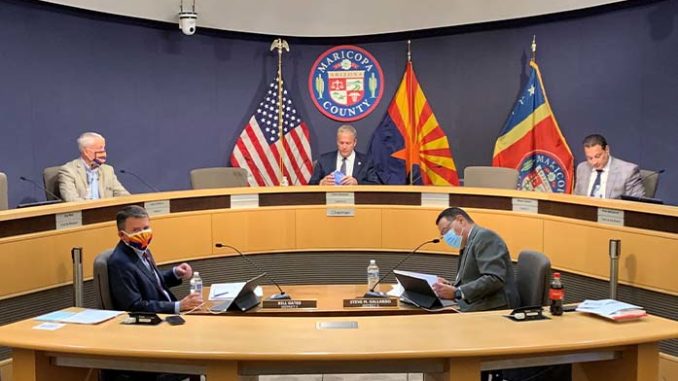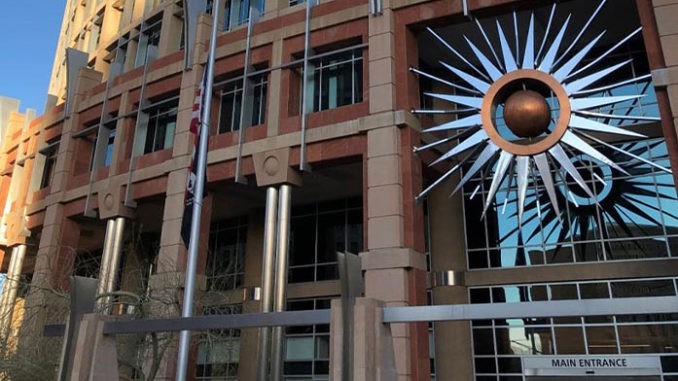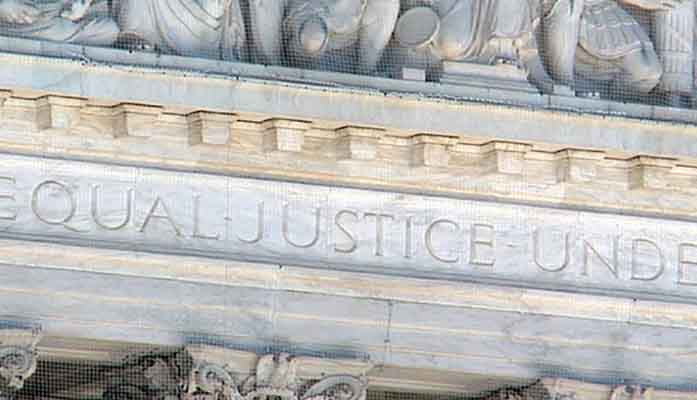
by Corinne Murdock | Oct 9, 2022 | News
By Corinne Murdock |
During her last year in the State Senate in 2018, Democratic gubernatorial candidate Katie Hobbs backed a bill to add 131 new tax auditors, managers, and staff to the Arizona Department of Revenue (ADOR) using $8.3 million in state funds. At the time, Hobbs was the State Senate’s minority leader.
Throughout her gubernatorial campaign, Hobbs said she would lighten the tax process burden for the working class if elected. Hobbs also pledged to cut income taxes for 800,000 families if elected governor.
Additionally, Hobbs promised that working-class Arizonans wouldn’t pay “a center higher” for her economic plan, nor would they face unnecessary tax burdens.
Hobbs’ proposed plan to increase ADOR was similar to the Biden administration’s recent accomplishment: expanding the IRS. In August, Congress voted to increase the size of the IRS by about 87,000 agents through the Inflation Reduction Act (IRA), a repackaged version of President Joe Biden’s Build Back Better (BBB) Act. Republicans decried the provision as a weaponization of the IRS that would cause disproportionate harm to the working class. Democrats dismissed those concerns, insisting that the IRS would only target the wealthy not paying their fair share of taxes, and that the IRA would mitigate inflation.
Last year, over 50 percent of all IRS audits targeted taxpayers making under $75,000 a year, which applies to about 171.6 million Americans (52 percent). About 25 percent of IRS audits applied to taxpayers making between $75,000 to $200,000, which applies to about 118.8 million Americans (36 percent).
In all, 75 percent of audits may apply to the 290.4 million Americans that comprise 88 percent of the population (about 330 million).
The bill that Hobbs cosponsored in 2018, SB1324, proposed the addition of two corporate income tax audit managers, 28 corporate income tax auditors, two transaction privilege tax managers, 28 transaction privilege tax auditors, two transaction privilege tax license compliance staff managers, 18 transaction privilege tax license compliance staff members, 40 tax collectors, and 11 support staff members.
The bill died quietly, having never received a vote in any committee. Its House companion, HB2137, experienced the same fate.
At the time, Governor Doug Ducey expressed a desire to expand ADOR — but by 25 tax collector positions that had been eliminated several years prior, about 80 percent less than what HB2137/SB1324 proposed. Ducey was looking for ways to make up about $83 million in lost audit revenue.
Corinne Murdock is a reporter for AZ Free News. Follow her latest on Twitter, or email tips to corinne@azfreenews.com.

by Corinne Murdock | Oct 9, 2022 | News
By Corinne Murdock |
On Thursday, the Department of Justice (DOJ) arrested an Iowa man for allegedly threatening Maricopa County Supervisor Clint Hickman.
64-year old Mark Rissi reportedly told Hickman in a voicemail last September that he was going to lynch and hang him for being a “lying commie” for supporting the results of the 2020 election. Rissi also issued a similar threat to Hickman via a voicemail left with Attorney General Mark Brnovich’s office in December.
“When we come to lynch your stupid lying Commie [expletive], you’ll remember that you lied on the [expletive] Bible, you piece of [expletive],” said the voicemail. “You’re gonna die, you piece of [expletive]. We’re going to hang you. We’re going to hang you.”
Although the DOJ press release announcing Rissi’s arrest didn’t identify Hickman as the subject of Rissi’s alleged threats, Hickman spoke out in a press release of his own to thank the DOJ and FBI. However, Hickman said that the DOJ’s actions weren’t enough because there were many other threats made to him, fellow supervisors, Recorder Stephen Richer, and numerous county elections staff.
Hickman also chided Arizonans “in positions of power [and] leadership [and] influence” for being silent.
“I’m speaking out today in hopes that others will follow. Whether it’s a person who shares your politics or your worldview or not, no one should be subjected to this kind of hatred,” stated Hickman. “And if we truly want to keep our country great, we will do everything we can to denounce threats against election workers and combat the disinformation that imperils our democracy.”
Maricopa County took another step to counter election disinformation recently. They launched a disinformation center and limited press access last week to control the narrative and manage the flow of information.
So far, the FBI has taken action against those who issued threats to elected officials critical of the 2020 election audit and claims of fraud. They haven’t made arrests for those threats made to Republican officials supportive of the audit, such as death threats given to Senate President Karen Fann (R-Prescott) and State Senator Michelle Ugenti-Rita (R-Scottsdale).
In August, the FBI charged a Missouri man for threatening Richer. In July, they arrested a Massachusetts man for threatening Secretary of State Katie Hobbs.
This latest arrest comes two days after the DOJ briefed 300 election officials and workers on available grant funding for physical election security enhancements, some of which may come from the American Rescue Plan; among those in attendance were election officials and their representatives from Arizona. The DOJ also updated the election officials on their Election Threats Task Force.
That task force, which launched last June, has reviewed over 1,000 contacts reported as hostile or harassing by the election community. The task force reported that only 11 percent of those contacts warranted an investigation. It’s unclear whether the threats faced by those such as Fann and Ugenti-Rita met the DOJ’s threshold.
CORRECTION: A previous version of this story listed the arrested man as being from Illinois. The man is from Iowa, and the story has been corrected.
Corinne Murdock is a reporter for AZ Free News. Follow her latest on Twitter, or email tips to corinne@azfreenews.com.

by Terri Jo Neff | Oct 8, 2022 | News
By Terri Jo Neff |
Katie Hobbs has her reasons for refusing to debate Kari Lake face-to-face in the race for Arizona Governor. But by doing so Hobbs is limiting the opportunities for Arizonans to hear her explain her history of supporting higher taxes while a member of the state legislature.
Hobbs, a Democrat currently serving as Arizona Secretary of State, has spent the last few weeks touting her promise to not raise taxes if elected. In fact, she is even promising to reduce taxes for many Arizonans even though it is doubtful that Democrats will control the legislature.
So with Hobbs making herself scarce for public questioning, voters are left to scrutinize her legislative history. And what can be found there casts doubt on her tax cut mantra.
Hobbs served in the Arizona State Senate from 2013 to 2019 and was Senate Minority Leader during much of that time. She also served one term as a member of the Arizona House of Representatives prior to the Senate.
In January 2018, Hobbs co-sponsored Senate Bill 1316 along with progressive Democratic Senators Juan Mendez, Jamescita Peshlakai, and Martin Quezada to eliminate the light class motor vehicle classification from Arizona’s fuel tax statutes.
But more importantly, SB1316 proposed to double the state’s per gallon motor fuel tax from 18 cents to 36 cents. The bill, which would have been one of Arizona’s largest tax hikes in state history, was so unpopular it was never heard by a Senate committee.
SB1316 is not the only time in Hobbs’ legislative history that she supported tax increases. In 2017, she was a fervent proponent of a sales tax increase that would have cost taxpayers between $500 and $600 million a year.
Also in 2018, Hobbs voted to impose an additional annual tax due when registering a vehicle. The new tax, set at $32 per vehicle, was so unpopular it was repealed by the legislature.
And back in 2015, Hobbs opposed critical legislation which was introduced to protect Arizonans from the effect of inflation on personal income tax brackets. The bill was eventually signed into law by Gov. Doug Ducey.
Hobbs’ legislative history on the subject of taxes is one reason organizations such as the Arizona Free Enterprise Club are encouraging voters to look at facts, not campaign speeches when it comes to Hobbs’ promise of tax cuts.
“Anyone who has followed Hobbs’ political career knows that this is just another outrageous lie,” AFEC posted Wednesday. “During her time in the state legislature, Katie Hobbs regularly opposed tax cuts for families while making it a habit to support multiple tax hikes….Hobbs has spent her political career trying to squeeze every possible dollar from your bank account.”

by Corinne Murdock | Oct 8, 2022 | News
By Corinne Murdock |
On Tuesday, the state of Arizona reached an $85 million settlement with Google over profiting on a deceptive acquisition of users’ location data. It is the most per capita that Google has paid out for this type of lawsuit.
In a press release announcing the settlement, Attorney General Mark Brnovich shared that the legal battle constituted one of the biggest consumer fraud lawsuits in state history.
“When I was elected attorney general, I promised Arizonans I would fight for them and hold everyone, including corporations like Google, accountable,” said Brnovich. “I am proud of this historic settlement that proves no entity, not even big tech companies, is above the law.”
Brnovich launched a two-year investigation into the Big Tech giant in 2018 after the Associated Press reported that users were misled and deceived about the collection and use of their Android smartphone’s location data — even if the user disabled their location history. The Big Tech giant would collect location data through other phone settings without consent in order to sell ads.
Brnovich stressed these facts when he sued Google in 2020. In all, the investigation and litigation took about four years.
“While Google users are led to believe they can opt-out of location tracking, the company exploits other avenues to invade personal privacy,” said Brnovich. “It’s nearly impossible to stop Google from tracking your movements without your knowledge or consent. This is contrary to the Arizona Consumer Fraud Act and even the most innovative companies must operate within the law.”
Over 80 percent of Google’s revenues were generated through advertising.
While Google misled users on how it would collect and profit off of their personal location data, they would purport to err on the side of transparency through initiatives like their “Transparency Report.” The company continues to raise concern about how governments and other corporations engage with individuals’ data.
They also used to publish an annual report, “Android Security Year in Review,” which discussed their efforts to protect Android users’ data. The last report of that kind was issued in March 2019, about 7 months after the AP report.
Google petitioned the courts to seal Brnovich’s complaint and exhibits in the case, prompting widespread backlash from transparency advocates. Some aspects of the documents are unredacted, though the remainder are redacted.
READ THE REDACTED COMPLAINT AND EXHIBITS AGAINST GOOGLE
Most of the $85 million will go to the state’s general fund, with $5 million set aside for attorney general education programs.
Joseph Kanefield, Brunn Roysden, and Michael Catlett handled the case for the attorney general’s office. Outside counsel included Kevin Neal and Ken Ralston of Gallagher & Kennedy, and Guy Ruttenberg and Mike Eshaghian of Ruttenberg IP Law.
Corinne Murdock is a reporter for AZ Free News. Follow her latest on Twitter, or email tips to corinne@azfreenews.com.

by Corinne Murdock | Oct 8, 2022 | News
By Corinne Murdock |
At next week’s policy meeting, the Phoenix City Council may decide on a proposed resolution to withhold city resources from enforcing abortion restrictions or bans.
The mayor’s communications director, Jeanine L’Ecuyer, informed AZ Free News of this adjusted timeline on Tuesday. The city council was expected to vote on the resolution last month. A copy of the resolution has yet to be made available for public review. City government staff were tasked with crafting the resolution back in June.
This week, the Phoenix Police Department instructed 911 dispatchers to not send patrol cars in response to calls reporting illegal abortions. Instead, dispatchers are to hand off the report to higher-ranking officers.
According to the PPD directive, they will notify their Violent Crimes Bureau (VCB) of the calls, who will then assign an investigator to follow up with the complainant.
L’Ecuyer didn’t confirm with AZ Free News whether the council or mayor directed PPD to issue this policy. This was her response to our inquiry:
“Typically, when a law or policy is put into place that may affect City operations, City leadership including the Law Department determine how/if City staff should adjust our processes,” stated L’Ecuyer. “Then, this is communicated to the appropriate staff so they have guidance on any impacts to their duties.”
If the Phoenix City Council approves the resolution next week, they will follow in the footsteps of the city of Tucson. In the wake of the Supreme Court (SCOTUS) ruling, the Tucson City Council passed a resolution in June effectively making their city a safe haven for abortions. Their resolution enables police to not arrest those who violate abortion law.
The Pima County Superior Court reinstated Arizona’s total abortion ban last month, and then last week denied a petition by Planned Parenthood to suspend the ban since they argued it conflicts with the 15-week limit on abortions codified earlier this year.
On Tuesday, Democrats in the state legislature petitioned Governor Doug Ducey to convene a special session to repeal the state’s total ban on abortions. The ban dates back to 1901, over a decade before Arizona achieved statehood. It doesn’t prosecute the mother for receiving an abortion, and allows abortions to save the mother’s life.
The most recent abortion restriction limiting abortions to 15 weeks stipulated that it doesn’t repeal the 1901 abortion ban.
Corinne Murdock is a reporter for AZ Free News. Follow her latest on Twitter, or email tips to corinne@azfreenews.com.

by Corinne Murdock | Oct 7, 2022 | News
By Corinne Murdock |
Earlier this week, the Republican National Committee (RNC) and Republican Party of Arizona (RPAZ) filed two lawsuits against Maricopa County over alleged election transparency violations and unnecessary poll worker burdens. Early voting for the general election begins next Wednesday, and there’s about a month until Election Day.
In a joint statement, RNC Chairwoman Ronna McDaniel and RPAZ Chairwoman Kelli Ward expressed concern that the county’s actions would shut poll workers out of the election process.
“With midterms just 34 days away, Arizonans deserve basic transparency about how their elections will be conducted,” stated the two women. “This legal offensive is the latest step in Republicans’ ongoing efforts to promote free, fair, and transparent elections in Arizona.”
The lawsuits concern the GOP’s unfulfilled records requests pertaining to poll worker staffing and the county staffing more Democratic than Republican poll workers for the primary election: 857 to 712. The RNC expressed concern that 11 vote centers at the time had no Republican poll workers, and that less than 30 percent of Central Counting Place Boards workers were Republicans while nearly 50 percent were Democrats.
The first lawsuit contended that Maricopa County wasn’t fulfilling records requests . The RNC documented that they submitted their first records request on September 9, then a follow-up records request on September 29 asking for records not fulfilled within their initial request. The lawsuit claimed that the county provided an indirect fulfillment of the initial request: the county forwarded the RNC a copy of an email originally sent from elections day and emergency voting director Scott Jarrett to a third party, which contained “narrative information” and addressed some, but not all, of the issues inquired about by the RNC.
Apart from that email, the lawsuit claimed that the county hadn’t provided all of the public records within both requests.
The second lawsuit contended that Maricopa County violated the state’s Equal Access Statutes and the Election Procedures Manual (EPM) during the primary election, and that the county would likely commit further violations for the upcoming general election. The GOP groups declared that the county established onerous working conditions for this election year: up to 14-hour work days throughout the early voting period, including weekends; a lack of a “bullpen” of election workers to backfill “foreseeable attritions” of the “inhospitable work conditions.”
According to that lawsuit, these working conditions caused over 500 election workers to quit their positions before the primary election. The lawsuit requested that the county reform its working conditions in order to align with election law and the EPM.
“Maricopa County nevertheless failed to meet the requirements of the Equal Access Statutes and the equal representation requirements of the EPM during the 2022 primary election,” stated the lawsuit.
On Wednesday, Maricopa County Recorder Stephen Richer and Board of Supervisors Chairman Bill Gates dismissed the RNC-RPAZ lawsuits as a “political stunt.” Richer and Gates insisted that it was “absurd” that they, as registered Republicans, would attempt to keep Republicans out of elections. In contradiction to what the second lawsuit stated, Richer and Gates claimed that the lawsuits don’t allege violation of election laws or procedures.
“We contact everyone on the lists the parties provide us,” stated the pair. “Maricopa County’s temporary election worker hiring practices ensure bipartisan representation throughout the election process and follow requirements established in state law and the Election Procedures Manual.”
The county also conflicted with the RNC’s timeline of its records request, contending that the RNC filed its records request on Monday.
Richer projected that the lawsuit would end in another legal victory for Maricopa County, adding to their current winning streak.
Corinne Murdock is a reporter for AZ Free News. Follow her latest on Twitter, or email tips to corinne@azfreenews.com.






